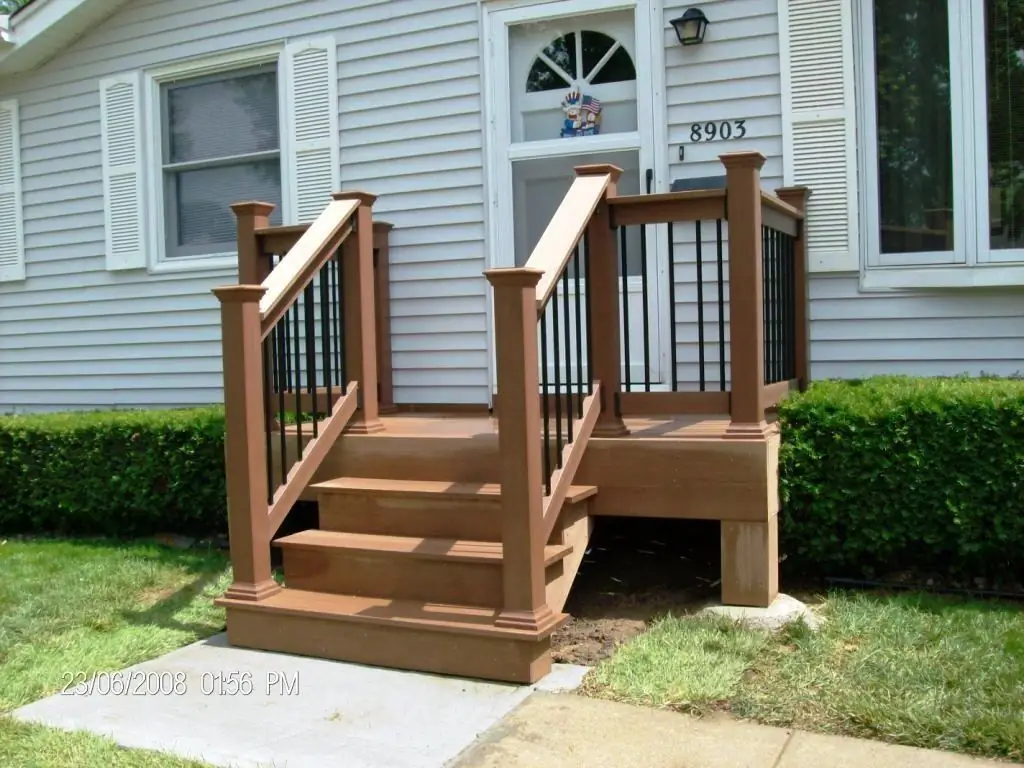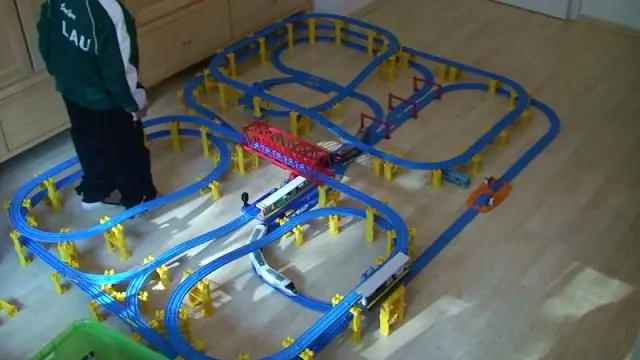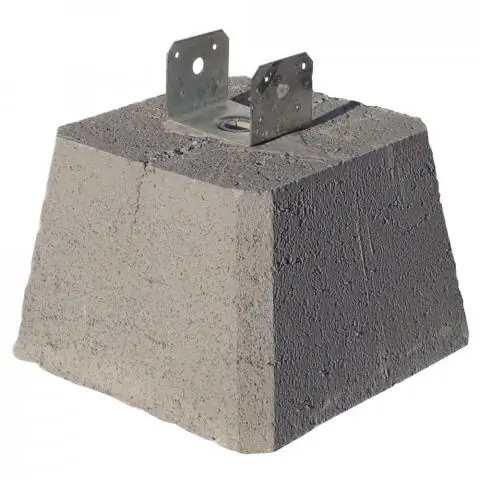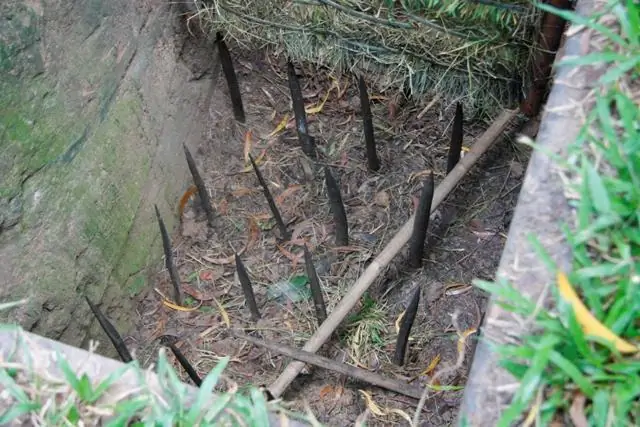
Table of contents:
- Turkish bath hammam do it yourself
- Turkish bath hammam: velvet warmth. We build with our own hands according to the rules
- The beneficial effects of hammam on the body
- Gallery: photos of small built-in hammams, easy to do with your own hands
- I want a hammam! How to do it?
- Calculation of material requirements, required tools
- Execution of work - step by step instructions
- Oriental tale
- Author Bailey Albertson albertson@usefultipsdiy.com.
- Public 2024-01-17 22:26.
- Last modified 2025-06-01 07:32.
Turkish bath hammam do it yourself

Each nation has its own bath traditions: the Finns have created a sauna, the Slavs have created a steam room with a high temperature for warming up "to the bones" in the cold season. Southerners, who did not suffer from frost, created a hammam with a softening atmosphere. Hammam is suitable for people who cannot stand high temperatures. Everyone can arrange a small hammam in the house or in the country with their own hands.
Content
-
1 Turkish bath hammam: velvet warmth. We build with our own hands according to the rules
- 1.1 Temperature
- 1.2 Humidity
- 1.3 Equipment room
- 1.4 Stone for cladding
- 1.5 Heating of walls, floors and loungers
- 1.6 Massage table
- 1.7 Curved ceiling
- 2 The beneficial effects of hammam on the body
- 3 Gallery: photos of small built-in hammams, easy to do with your own hands
-
4 I want a hammam! How to do it?
- 4.1 Hammam size
- 4.2 Several planning solutions for built-in hammams.
- 4.3 Selection of materials
- 4.4 Selecting a steam generator
- 4.5 Choice of heating medium
-
5 Calculation of material requirements, required tools
5.1 Required tools
-
6 Performance of work - step by step instructions
- 6.1 Sub floor
- 6.2 Equipment installation
- 6.3 Benches and lounger
- 6.4 Ceiling
- 6.5 Vapor barrier
- 6.6 Heating system
- 6.7 Waterproofing
- 6.8 Finishing cladding
- 6.9 Clean floor
-
7 Eastern tale
7.1 Hammam traditions and usage
Turkish bath hammam: velvet warmth. We build with our own hands according to the rules
Hammam, who came from Turkey, is a descendant of ancient Roman terms. Having raised purity into a religious dogma, Islam made a weekly trip to the bathhouse obligatory, and the mild climate of Islamic countries, which did not require warming up "to the bone," turned the bath procedure into a pleasure.
According to the Russian Spelling Dictionary of the Russian Academy of Sciences / Ed. V. V. Lopatina, O. E. Ivanova. M., 2012, spelling the word as "hammam" is considered incorrect, correctly: "hammam".

The classic hammam was built of stone
The main differences between the hammam and other types of baths:
- Gentle temperature;
- Humidity above 70%;
- Separate room for equipment;
- Stone cladding and furniture;
- Heated floors, walls and loungers;
- A massage table
- Domed or arched ceiling;
- Forced ventilation with 4-fold exchange.
Let's consider these features in detail.
Temperature
The hammam differs from the Russian bath and the Finnish sauna with a comfortable temperature of 30 to 55 ° C and 100% humidity. The gentle temperature is especially pleasant for people who do not like or cannot be in a steam room with high temperatures.
Humidity
Initially, steam for the hammam was obtained by boiling water in huge vats, and then fed through pipes to the steam room. Steam is now produced using steam generators, which take up little space. The condition for placing the steam generator is no further than 15 meters from the steam room.
Equipment room
Separate placement of equipment is justified: nothing should interfere with the enjoyment of the procedure and the relaxation of the steaming person, safety is also important - the proximity of naked people with boiling water boilers.
Stone for cladding
Initially, the contour of the hammam premises was made of stone - marble or granite. Since the loungers are made with heating to body temperature or slightly higher, it is comfortable to lie on them. However, the cost of natural stone and processing is high, the stone is replaced with ceramic tiles or mosaics.
Heating of walls, floors and sun beds
To place a steam room in a hammam, heating of the floor, walls and loungers is provided using floor heating systems, water, electric or film (infrared).
A massage table
Traditionally, a soap massage is performed in a Turkish bath, which has a relaxing effect. To perform the massage, a massage table is installed for several people, originally also stone, with heating.
Curved ceiling
The ceiling in the form of a dome or arch is made in a hammam so that the condensation from the steam that settles on the surface of the ceiling does not drip down onto the lying people, but slowly flows down the walls.
Question: what do the hammam and the usual steam room have in common? Answer: the fact that both there and there visitors enjoy!
The beneficial effects of hammam on the body
Any bath is beneficial to the body, but not everyone can tolerate high temperatures. The Turkish hammam also has contraindications - for asthmatics, cancer patients, hypertensive patients and those who cannot stand high humidity, the way here is closed. However, fans of this type of steam room believe that the hamam is capable of:
- Cleanse the body of toxins;
- Recover;
- Cleanse the respiratory system;
- Reduce pain;
- Help with insomnia;
- Help with colds;
- Improve the condition of the skin;
- Have a positive effect on metabolism, promoting weight loss;
- Have a positive effect on digestion.
Gallery: photos of small built-in hammams, easy to do with your own hands
-

A traditional hammam should have a massage table - When the area of the steam room allows, the installation of a massage table is welcome.
-

Small homemade hammam - The limited size of the room forced to abandon the massage table
-

Anatomically shaped lounger - Loungers that follow the curve of the spine, another hammam tradition
-

Small hammam with an interior in the style of ancient Roman terms - The style of this interior is more reminiscent of the ancient Roman baths than the baths of the East.
-

Small footprint is not an obstacle to comfort - Kurna made of stone, anatomical lounger, bench - all the attributes of a hammam fit into a small area
-

Hammam in the style of the East - A small room is decorated with oriental ornaments
-

Not a trivial solution - The original ceiling in the form of a wavy semi-arch makes the interior original
-

Small steam room and maximum amenities - The rich decor with oriental ornaments creates the atmosphere of the East, and the anatomical lounger that turns into a bench creates all conditions for relaxation
-

Hidden lighting in the interior - Hidden illumination creates a sense of mystery, colors soothes
I want a hammam! How to do it?
If a classic Russian steam bath requires only a skilled stove-maker, then such a technically complex structure as a hamam cannot be built without a project. The preparatory period is especially important, during which the main issues are resolved:
- The size of the structure;
- Materials for construction and decoration;
- Steam generator type;
- Surface heating method.
Hammam size
The simplest hammam can be arranged in a house on a free area, if, deviating from the classical requirements for a Turkish bath, you do not make a massage table, but confine yourself to a steam room adjacent to the relaxation room and a technical room for a steam generator. Despite the small size of the room, there are many options for the layout of this type of hammam. In addition, you do not have to perform zero-cycle work - digging a trench, making waterproofing, formwork and pouring the foundation.
Several planning solutions for built-in hammams
-

Small homemade hammam - In a small room you can place a bench, an anatomical lounger and a bowl - kurna
-

Mini hammam in the house - with a limited area, the bench can be placed at a corner, and instead of a kurna, a waterfall can be made
-

Hammam layout with massage table - When the area of the room allows, a massage table is installed in the middle
If it is decided to build a real hamam, then it will be necessary to build a detached house with a supply of water, sewerage and electricity, the construction of which will not be quick and will entail significant financial costs.
When constructing a detached Turkish bath building, you will need to complete the construction stages:
- Preparatory period with design;
- Zero cycle works with supply of communications and construction of the foundation;
- Civil works;
- Finishing work;
- Installation of equipment;
- Furnishings.

Turkish bath with a full range of premises
Choice of materials
basic requirements for materials for the construction and decoration of the Turkish hammam:
- Strength;
- Steam and moisture resistance;
- High temperature resistance;
- Environmental Safety.
Classic hammams were built of stone, now they give preference to bricks, since according to the current standards, building a room with a wet mode of operation, which includes a Turkish bath, can be made of solid plastic pressed bricks. From aerated concrete blocks for construction, blocks of expanded clay concrete are suitable, as they have the best indicator in terms of strength and water absorption, but after processing with special water-repellent compositions.

For the construction of a bath, expanded clay concrete blocks are most suitable
As for the interior decoration, marble or granite cladding is good, but only a few can afford it. It is easier to revet the interior with ceramic mosaics, which are not inferior to natural stone in terms of environmental friendliness and heat resistance, but are several times cheaper.
Hot and cold water in the hammam is traditionally supplied to a stone bowl "kurna", it can be round, semicircular or angular. Kurna is wall-mounted, installed in a niche or in the middle of a steam room.
The floor in the hammam is made with a slope towards the drain, which is most often located next to the hen.
To reduce energy consumption, it is better to protect the walls from the inside with foil vapor barrier: in this case, the thermal energy will be reflected back into the room.
The outer walls of the premises are insulated according to the usual scheme, additionally protecting the insulation with a vapor barrier membrane from the steam room wall.
Steam generator selection
Vats with boiling water have long been a thing of the past, now steam is obtained using a steam generator, the performance of which depends on the volume of the steam room. On sale you can find equipment made in Germany or Finland, which has proven itself well.

Instead of vats of boiling water, steam in the hammam is now created with a steam generator
The choice of coolant
Since all surfaces in the hammam, except for the ceiling, are heated, the choice of heating medium is of great importance.
When installing water heating, you need a boiler that can maintain a constant temperature of the coolant and the implementation of a separate circuit for the bath, so as not to heat the house in the summer, if you want to steam. Water heating pipes are embedded in a screed, the thickness of which is 20-30 mm greater than the pipe diameter.

The coolant pipes are placed on all surfaces of the hammam, except for the ceiling
Electric floor heating has two subsystems:
- Cable;
- Heating mats.

The small thickness of the heating mats eliminates the need for a screed
This type of heating is easier to perform than water heating, and the thickness of the screed will be much less. The choice of a coolant is often related to the power of electrical networks: they may not withstand the additional load.
The simplest system is a foil underfloor heating, which does not require a screed and is laid in a layer of tile glue when facing. The maximum temperature of the surface heated by the film system is not higher than 45 ° C, which makes infrared heating safe and especially suitable for hammam. Energy consumption with a film system is lower than with cable heating, only the cost of such a floor stops it.

Infrared heating films are placed only in the walking area
Calculation of material requirements, required tools
The calculation of the need for materials can be performed by focusing on a specific hammam project, since it directly depends on the area and volume of the premises. For the construction of a steam room with a plan size of 1.99x2.2 meters and a height of 2.5 meters inside an inhabited residential building with film surface heating, materials will be needed:
- Brick for laying the base of the bench and lounger;
- Moisture-resistant, non-corrosive material for subfloors, arched ceilings, bench and lounger shelves, cement-bonded or glass-magnesite sheets are best;
- Cement - sand mortar;
- Ceramic floor tiles;
- Ceramic or glass mosaic for wall cladding, deck chairs and ceiling;
- Tile adhesive;
- Wood to create a circle for the arched ceiling and the anatomical profile of the lounger;
- Fully equipped door;
- Pipes for steam supply from the steam generator;
- Pipes for supplying the sewer to the ladder;
- Water repellent solution for wall surfaces;
- Foil vapor barrier;
- Waterproofing material for the floor (in 2 layers);
- Fasteners - screws and dowels.
It is possible to make sun loungers on a metal roll frame, in this case a brick will not be needed, but the consumption of a glass magnesite sheet (MSL) will increase and a 50x5 corner will be added.
All metal elements must have an anti-corrosion coating, pipes and electric cables must be heat-resistant.
Hammam equipment:
- Steam generator;
- Infrared films for surface heating and control and management system;
- The bowl is a kurna;
- Plumbing - taps, ladders;
- Ventilation system;
- Waterproof fixtures and LED strip.
If desired, this list can be supplemented with an aroma generator, color music system and a rain shower head.
Required tools
The set of tools for performing work also depends on the chosen design and materials. To set up a steam room with loungers made of magnesite glass sheets on a metal frame and lining the room with mosaic tiles, you will need:
- Level;
- Yardstick;
- Trowel;
- Smooth and notched trowel;
- Drill;
- Screwdriver;
- Electric jigsaw;
- Milling machine;
- Capacity for mortar and glue;
- Roller and brush;
- Scaffold.
Execution of work - step by step instructions
We begin the work with the device of the sewer drain - we bring the sewer pipe to the place where the ladder is installed. We put cables into the room for connecting the lighting system, surface heating, water supply and ventilation.
We impregnate walls and ceiling surfaces with a water repellent solution.
Rough floor
We carry out a rough floor: we lay on logs in two layers LSU sheets with a thickness of 14 mm. In the absence of lags and floor insulation, we level the base soil, fill it with sand or small rubble, and ram. We carry out support posts measuring 250x250 mm, the height depends on the height of the basement of the house, made of solid brick with a lattice of 1x1 meter. We lay the logs with the attached cranial bars, we make the first subfloor from a moisture-resistant material. We install a moisture-windproof membrane; we lay the insulation (according to the calculation); we cover the insulation with foil vapor barrier, attaching it to the logs and insulation with a construction stapler.

A superdiffusion membrane, insulation and foil vapor barrier are placed on the subfloor in succession
We mount the rough floor of the hammam from LSU sheets in 2 layers, with a break in the seams, we remove the sewer pipe. We carry out a slope to the ladder from a cement-sand mortar with a thickness of 10 - 25 mm (5%).
Installation of equipment
In the technical room we mount a steam generator, connect it to the water supply system, power it from the mains, and bring the steam supply pipes into the steam room.

The steam generator is mounted in an adjacent room or no further than 15 meters from the hammam
We mount the surface heating power supply system, install a regulator and a temperature sensor.
Benches and lounger
We make a frame from 50x5 corners for benches, we fasten the frame to the walls and floor with expansion dowels with thermally insulated heads to avoid cold bridges. To make an anatomically shaped lounger, we prepare a circle from boards or LSU sheets, we make a frame from a corner in a circle, install the structure in place. We connect the steam distribution pipes to the outlet of the steam generator and the steam nozzles, which are located under the seats.

Steam supply scheme in the hammam: turquoise arrows - steam, red - heated surfaces
We sew up plank beds, a bench and a massage table with sheets of glass magnesite on self-tapping screws, at the same time mounting the steam leads under the benches.

The wet sheet of LSU is attached to a pre-made frame
Please note: LSU sheets have different surfaces - one is smooth, with an acrylic finish, the second is rough. To increase the adhesion with subsequent layers, the suture is performed with a rough surface up

Glass magnesite sheets have surfaces of different textures: one side is rough, the other is smooth
Ceiling
The circular arch vault is mounted in place. To install it, support guides from a 50x5 corner or glass-magnesite sheets are pre-attached to the wall in several layers.

wet glass magnesite Sheet is easy to bend to the desired shape according to the template - circle

Wet leaf bends effortlessly
Vapor barrier
We mount a vapor barrier on all surfaces: walls, deck chairs, benches, ceiling. We fasten the vapor barrier sheets with special vapor barrier tape, with an overlap of 10 cm.

Vapor barrier canvases are overlapped, the joints are glued with a special heat-resistant vapor barrier tape
Heating system
On top of the vapor barrier on all surfaces, except for the ceiling, heating elements are fixed, connected to an electric cable.

The cable heating system is installed on all surfaces of the room except the ceiling
We connect a temperature sensor and a thermostat to the heating system, we power the entire system from the power supply.

The thermostat can be mounted in an adjacent room
Waterproofing
Apply a layer of waterproofing plaster on all surfaces, then a layer of primer to increase adhesion.

Lubricating waterproofing 6-7 mm thick will protect structures from excessive moisture
Finishing cladding
Sheets of mosaic tiles are attached to a layer of heat-resistant glue.

Mosaic tiles are sold face-down on special paper, which is removed after the tiles are glued
Clean floor
Ceramic floor tiles are laid on a layer of heat-resistant glue.

After laying the tiles, the joints must be filled with a joint.
They install equipment, a kurna, lamps, connect a crane.

The kurna can be purchased ready-made from ornamental stone. Such bowls look especially decorative.
The hamam is ready to receive visitors.
Oriental tale
With the word "hamam", most people associate with the tales "1000 and 1 night", harem, odalisques. The traditional decoration of the Turkish steam room assumes an oriental flavor - the colors of turquoise, lapis lazuli, gold, and the corresponding accessories - jugs, bowls, lamps. But it will not be a crime to change the color scheme to a more impressive one for the owners.
Hammam traditions and features of use
In the classic hammam, the visitor, having undressed and taking a shower, goes through several rooms with different temperatures, gradually warming up the body and relaxing, before the main pleasure - a soapy massage. They start with a temperature of 30 ° C, getting used to it, move to the next room with a higher temperature, gradually increasing to a maximum of 55 ° C. Rest at a lower temperature is required after the massage.
Often an aroma generator is attached to the perogenerator, saturating the steam with various exotic scents. In a bowl - kurna, decoctions of medicinal herbs are prepared, with which the body is washed.
In a home mini-hammam, a gradual step-by-step adjustment of the steam generator to increase the steam temperature is possible, however, steam is not supplied with a temperature higher than 45 ° C.
Hamam is a slow pleasure, because in the east it is not customary to rush.
www.youtube.com/embed/i3NFvNb-s1U https://www.youtube.com/embed/YRWpu54ZO-o https://www.youtube.com/embed/YRWpu54ZO-o https:// www.youtube.com / embed / YRWpu54ZO-o https://www.youtube.com/embed/YRWpu54ZO-o https://www.youtube.com/embed/YRWpu54ZO-o https://www.youtube.com/ embed / YRWpu54ZO-o
Save
Acquaintance with the hammam in Turkey while on vacation caused an increase in the number of fans of this bath among Russians. The novelty of the softening atmosphere, the pleasant soapy massage combined with aromatherapy are the reasons why an increasing number of homeowners are building home hammams. Performing work is associated with certain difficulties, but they are surmountable provided that the technology is followed and the right materials are selected.
Recommended:
How To Build A Wooden Porch With Your Own Hands: In Stages, Photos And Videos

Detailed description of the construction of a wooden porch. Materials used, work procedure step by step
How To Make A Bar Stool With Your Own Hands From Wood, Metal And Other Materials + Drawings, Photos And Videos

Bar stools manufacturing options. Required tools, materials used. Step-by-step description of the manufacturing process with a photo
How To Make A Veranda With Your Own Hands To The House - Instructions, Projects, Drawings, Photos And Videos

The article describes how to build a veranda close to the house with your own hands
How To Choose And Build A Foundation For A Bath With Your Own Hands - 4x6, 3x4 And Other Sizes, Tips, Instructions, Photos And Videos

How to make a foundation for a bath with your own hands. Types and features of foundations. The choice of materials and technology, installation rules and step-by-step instructions
How To Build A Warm Chicken Coop For The Winter With Your Own Hands - Instructions With Photos And Videos

The need to insulate the chicken coop. What material can be used. How to make a winter poultry house yourself: step by step instructions. Treatment and care
